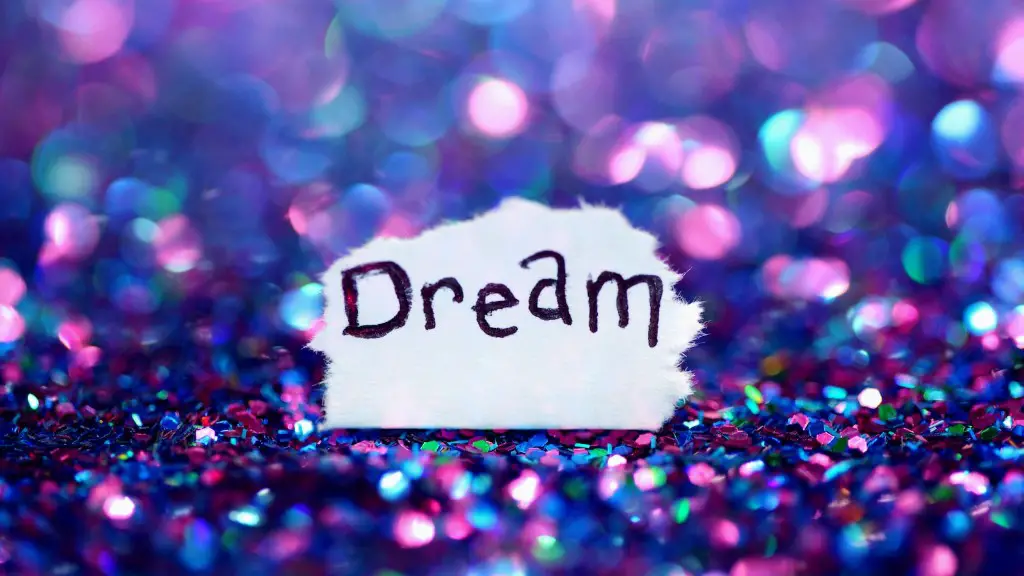In recent years, scientists have made great strides in understanding where dreams come from and how they are produced. It was once thought that dreams were a reflection of the subconscious mind, but it is now known that they are actually a product of the brain’s attempt to make sense of the day’s events. Dreams are thought to be a way for the brain to process information and sort out memories.
There is no one answer to this question as everyone experiences dreams differently. Some people believe that dreams are a product of the subconscious mind, while others believe that they are a glimpse into another realm or reality. There is no definitive answer, but it is an interesting question to explore.
How are our dreams made?
The activation-synthesis hypothesis is a theory that suggests that dreams are caused by brainstem activation during rapid eye movement (REM) sleep and stimulation of the limbic system (emotional motor system). This theory was first proposed by Dr. Allan Hobson in the early 1970s.
REM sleep is a special type of sleep that is characterized by rapid eye movement and increased brain activity. It is believed that REM sleep is important for memory and learning.
Are dreams real or fake
Dreams can be aproducts of a person’s imagination, but they can also be based on real experiences. Dreams can be a way for a person to process and make sense of their emotions. Dreams can also be a way for a person to work through their problems.
MCH cells are thought to be responsible for dreams. When these cells are activated, they prevent the content of a dream from being stored in the hippocampus. As a result, the dream is quickly forgotten.
How long do dreams last?
Dreams can last for a few seconds, or up to 20-30 minutes. People tend to remember dreams better if they are awoken during the REM phase.
Blind people may dream differently than sighted people, but their dreams can be just as vivid and interesting. Although visual content may be reduced, other senses are enhanced in dreams of the blind. Blind people are more likely to experience sensations of sound, touch, taste, and smell than sighted people. This can make for some very interesting and unique dreams.
Can you control your dreams?
Lucid dreaming is a state of consciousness during which a person is aware that they are dreaming. Lucid dreaming can occur during REM sleep and often allows the dreamer to control the dream’s storyline and environment. Lucid dreaming has been shown to be an effective treatment for conditions like recurring nightmares and PTSD.
Dreams are a way for our brain to process and make sense of our emotions. It is believed that dreams help us take the sting out of our painful emotional experiences, so that we can learn from them and carry on with our lives. The evidence points toward an important function of dreams, and helps to explain why we have them.
Can you feel pain in dreams
research has shown that pain sensations occur in about 1% of the dreams in healthy persons and in about 30% of patients with acute, severe pain.
There is currently little scientific evidence to suggest that dreams can predict the future. However, some research has suggested that certain types of dreams may help predict the onset of illness or mental decline. More research is needed in this area to determine if there is any predictive value to dreams.
What are the 7 most common dreams?
There is no one-size-fits-all answer to the question of what dreams mean, as the interpretation of dreams is highly personal. However, there are some common themes and symbolism that often appears in dreams, and which may offer clues as to what the dreamer is experiencing in their life.
The seven most common dreams, according to research, are being attacked or chased, being late, loved ones dying, falling, flying, school, and sex. each of these dreams can symbolize something different, depending on the individual’s own life experiences and personal context.
For example, a dream of being chased may symbolize feelings of insecurity or anxiety, while a dream of being late may represent feelings of inadequacy or stress. A dream of flying may represent a desire for freedom or escape, while a dream of school may represent a need for more knowledge or understanding. And a dream of sex may symbolize a need for intimacy or connection.
No matter what the specific dream means to you, it is important to remember that dreams are often symbolic of something going on in your life. If you have a recurrent dream that is causing you distress, it may be worth exploring what the dream is trying to tell you with the help of a therapist
It is a well-known fact that our brain is not fully developed when we are born. It continues to grow and change during the critical period of our lives known as childhood. As our brain develops, so does our memory. This is why it is so important to provide children with plenty of opportunities to learn and remember new information.
What happens if you remember a dream
There are a few reasons why you might remember your dream. It could be that you simply woke up during it, so it’s fresh in your mind. Or remembering could mean that you’re remembering the very last dream you had rather than the dream in full. Sometimes, people remember their dreams because they are related to something that’s going on in their life. If you’re worried about something, you might have a dream that reflects those worries. If you’re excited about something, you might have a dream that reflects that excitement.
There is still much unknown about dreaming, but researchers have found that it is a common and healthy thing to remember your dreams. It is normal to forget dreams or have difficulty recallimg them, and this does not mean you are not sleeping well or are crazy.
How long is 1 second in a dream?
It is interesting to note that scientific experiments have shown that one second in a dream is just as long as one second in reality. This was determined by having the subject count the seconds in his dream, and then compare it to counting the seconds in reality. This proves that our perception of time in a dream is just as accurate as our perception of time in reality.
REM sleep is characterized by rapid eye movements. The longest recorded period of REM sleep is one of 3 hrs 8 mins by David Powell at the Puget Sound Sleep Disorder Center in Seattle, Washington on 29 April 1994.
Warp Up
The answer to this question is not entirely clear, as there is still much research to be done in this area. However, it is believed that dreams are created by the brain during the REM (Rapid Eye Movement) stage of sleep. During this stage, the brain is more active and is thought to create images and stories based on our thoughts, feelings, and experiences from the day.
There is no one answer to this question as everyone experiences dreams differently. Some people may believe that dreams are made in the mind, while others may believe that they are a result of the subconscious. Whatever the belief, it is clear that dreams play an important role in our lives and help us to process the events of our day.





